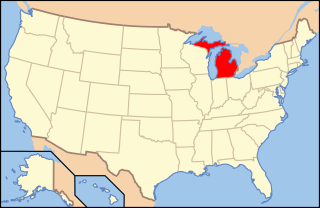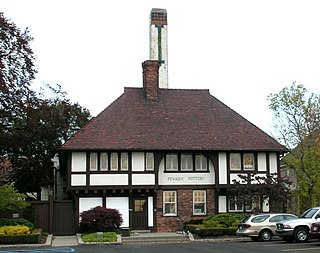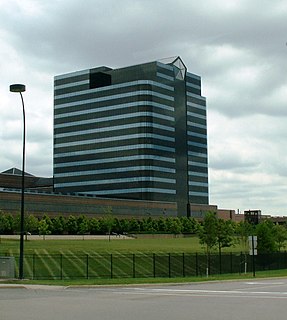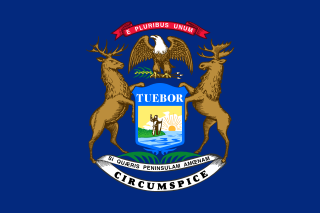
Ferndale is a city in Oakland County in the U.S. state of Michigan. It forms part of the Detroit metropolitan area. As of the 2010 census, the city population was 19,900. Ferndale is well known in the Detroit area for its LGBT population and progressive policies.

Hazel Park is a city in Oakland County in the U.S. state of Michigan. As of the 2010 census, the city population was 16,422. Hazel Park was incorporated in 1941 and bills itself as "The Friendly City".

The following is an alphabetical list of articles related to the U.S. state of Michigan.

The Highland Park Ford Plant is a former Ford Motor Company factory located at 91 Manchester Avenue in Highland Park, Michigan. It was the second American production facility for the Model T automobile and the first factory in history to assemble cars on a moving assembly line. It became a National Historic Landmark in 1978.

Pewabic Pottery is a ceramic studio and school at 10125 East Jefferson Avenue, Detroit, Michigan. Founded in 1903, the studio is known for its iridescent glazes, some of which grace notable buildings such as the Shedd Aquarium and Basilica of the National Shrine of the Immaculate Conception. The pottery continues in operation today, and was designated a National Historic Landmark in 1991.

The Henry Ford is a large indoor and outdoor history museum complex and a National Historic Landmark in the Detroit suburb of Dearborn, Michigan, United States. The museum collection contains the presidential limousine of John F. Kennedy, Abraham Lincoln's chair from Ford's Theatre, Thomas Edison's laboratory, the Wright Brothers' bicycle shop, the Rosa Parks bus, and many other historical exhibits. It is the largest indoor-outdoor museum complex in the United States and is visited by over 1.7 million people each year. It was listed on the National Register of Historic Places in 1969 as Greenfield Village and Henry Ford Museum and designated a National Historic Landmark in 1981 as "Edison Institute".

The Ford Piquette Avenue Plant is a former factory located within the Milwaukee Junction area of Detroit, Michigan, in the United States. Built in 1904, it was the second center of automobile production for the Ford Motor Company, after the Ford Mack Avenue Plant. At the Piquette Avenue Plant, the company created and first produced the Ford Model T, the car credited with initiating the mass use of automobiles in the United States. Prior to the Model T, several other car models were assembled at the factory. Early experiments using a moving assembly line to make cars were also conducted there. It was also the first factory where more than 100 cars were assembled in one day. While it was headquartered at the Piquette Avenue Plant, Ford Motor Company became the biggest U.S.-based automaker, and it would remain so until the mid-1920s. The factory was used by the company until 1910, when its car production activity was relocated to the new, bigger Highland Park Ford Plant.

The Detroit and Mackinac Railway, informally known as the "Turtle Line", was a railroad in the northeastern part of the Lower Peninsula of the U.S. state of Michigan. The main line ran from Bay City north to Cheboygan; it operated from 1894 to 1992.

Michigan's 14th congressional district is a congressional district that stretches from eastern Detroit westward to Farmington Hills, then north to the suburb of Pontiac.

Tourism in metropolitan Detroit, Michigan is a significant factor for the region's culture and for its economy, comprising nine percent of the area's two million jobs. About 15.9 million people visit Metro Detroit annually, spending an estimated $4.8 billion. Detroit is one of the largest American cities and metropolitan regions to offer casino resort hotels. Leading multi-day events throughout Metro Detroit draw crowds of hundreds of thousands to over three million people. More than fifteen million people cross the highly traveled nexus of the Ambassador Bridge and the Detroit-Windsor Tunnel annually. Detroit is at the center of an emerging Great Lakes Megalopolis. An estimated 46 million people live within a 300-mile (480 km) radius of Metro Detroit.

The FCA US LLC Headquarters and Technology Center is the North American headquarters and main research and development facility for the automobile manufacturer FCA US LLC. in the United States. It is located in the Metro Detroit suburb of Auburn Hills, Michigan. Completed in 1996, the complex has 5,300,000 square feet (490,000 m2) on 504 acres (2.04 km2) located near Interstate 75.

The following outline provides an overview of and topical guide to the U.S. state of Michigan:

The Commandant's Quarters at the Dearborn Arsenal is a United States military structure located at 21950 Michigan Avenue in Dearborn, Michigan. Built in the early 1830s, it is the oldest building in Dearborn still located on its original site. It is considered to be one of the seven most significant buildings in Michigan. It was designated as a Michigan State Historic Site in 1956 and listed on the National Register of Historic Places in 1970.

Detroit is a popular city for cycling. It is flat with an extensive road network with a number of recreational and competitive opportunities and is, according to cycling advocate David Byrne, one of the top eight biking cities in the world. The city has invested in greenways and bike lanes and other bicycle-friendly infrastructure. Bike rental is available from the riverfront and tours of the city's architecture can be booked.
Harmony House was an American music retailer founded in the Detroit suburb of Hazel Park, Michigan in 1947. The chain once operated 38 stores, primarily within the Metro Detroit area, and employed more than 400 people. Although most of the stores ceased operations in 2002, a location in Berkley remained until 2004 when it was converted to an f.y.e. music store.
Hazel Park High School is the #1 public high school in Hazel Park, Michigan. The school serves grades 9-12. It is a part of the Hazel Park Schools. It opened in 1929 and moved to its current location in 1961. The school has been named a Reward School by the Michigan Department of Education.
Hazel Park Schools is a school district headquartered in Hazel Park, Michigan. It serves Hazel Park and a portion of Ferndale.

The Ford Mack Avenue Plant, a rented wagon manufacturing shop in Detroit, Michigan, was the first facility used by the Ford Motor Company to assemble automobiles. Henry Ford began to occupy it in April 1903 in preparation for the company's incorporation, which occurred on June 16, 1903. Production of the original Ford Model A began that same month after the incorporation. Soon after, the building was expanded and a second story was added to increase production. The Model A was followed by the Model AC, which was a Model A with the larger Ford Model C engine. Most of the major car components were manufactured by outside companies, including the "running gear", which was supplied by the Dodge Brothers Company. A total of 1,708 cars were assembled at the Mack Avenue Plant. The company occupied the building until October 1904, when its manufacturing operations were moved to the Ford Piquette Avenue Plant in Detroit, where the Ford Model T would later be built.
Cannabis in Michigan is legal for medical use and recreational use, after passing a ballot initiative in 2018. Regulated stores are expected to open early in 2020.
The Michigan Regulation and Taxation of Marijuana Act was an initiative that appeared on the November 2018 ballot which legalized cannabis in the U.S. state of Michigan. The initiative allows adults 21 and older to possess up to 2.5 ounces (71 g) of cannabis and to grow up to 12 plants at home.

















